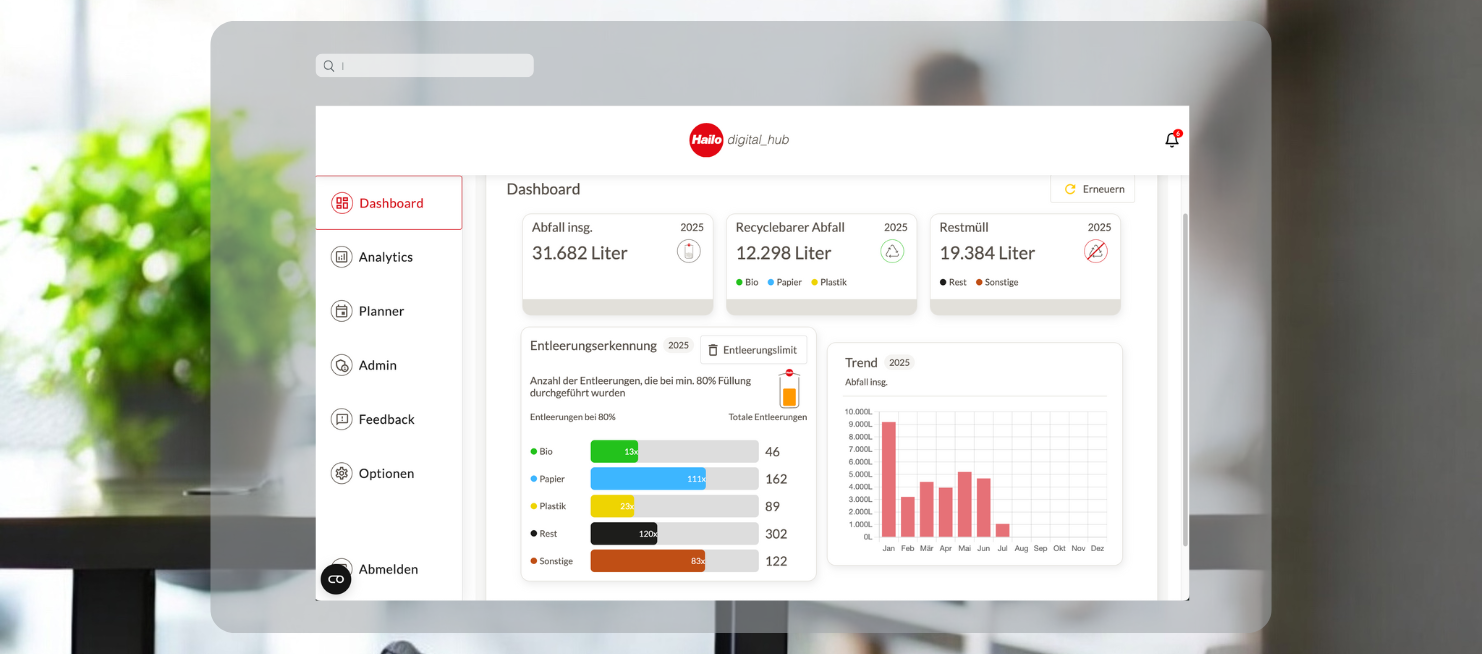Sustainability in Waste Management – Creating Greener Offices with Smart Waste
Sustainability as a corporate Priority
Sustainability has evolved from a trend into a core business imperative. Stakeholders from customers to investors to employees expect companies to act responsibly and reduce their environmental impact. Waste management, while often overlooked, holds untapped potential for ecological progress.
Many initiatives focus on energy and mobility, while waste remains a neglected area. Yet smart waste processes reduce resource use, costs, and improve sustainability performance—helping protect the environment and budgets alike.
Weaknesses of Conventional Waste Management
There are various ecological weaknesses in conventional waste management in companies:
- Low Recycling Rates:
Insufficient separation often results in recyclable materials ending up in residual waste due to low employee compliance or poor bin infrastructure. - Excessive Resource Consumption:
Fixed emptying schedules drive unnecessary trips and waste of plastic bags—raising the cleaning service’s CO₂ footprint. - Lack of data:
Without measurements, organizations struggle to track waste volumes, identify problem areas, or assess the impact of waste-reduction efforts.
These points show that there is a need for action. This is where the digitalization of waste management comes in: Through sensors and data (see also: Digital waste management with dashboard), the problems mentioned can be effectively addressed.
Smart Waste as a Sustainability Booster
Intelligent waste solutions contribute to greener corporate governance in several ways:
Fewer emissions and waste
As described in previous articles, emptying as required means fewer trips and therefore less fuel consumption. Especially in large campus buildings or industrial sites, where cleaning personnel travel with vehicles or machines, the savings potential adds up. Fewer laps mean less CO2 emissions and also less noise pollution. The consumption of consumables is also reduced: If 30% fewer trash bags are used because half-full containers are no longer routinely emptied, this directly reduces the impact on the environment.
Higher recycling rate and waste prevention
Thanks to the transparency that Smart Waste Solutions create, companies can see exactly which types of waste are generated and in which quantities. This data can be used to take targeted recycling measures. For example, you can identify locations where many recyclable materials end up in residual waste and introduce training or better separation systems there. Success can also be measured: If the recycling rate rises after the introduction of intelligent solutions, this is a direct increase in sustainability. At the same time, such projects encourage employees to deal with waste more consciously. When feedback comes via the dashboard (e.g. “Your division produced 10% less residual waste this week”), this promotes environmental awareness and motivation to avoid waste.
Measurable sustainability goals and ESG compliance
Smart Waste provides tangible indicators that are decisive for achieving sustainability goals. Many companies have included targets such as “30% waste reduction in 5 years” or “higher recycling rates” in their ESG programs. With conventional means, such goals can hardly be checked — without data, who knows whether progress is being made? The sensors and the associated dashboard provide a remedy here: They collect all relevant data in real time and over the long term h16b.com. Progress (or setbacks) can be quantified. If necessary, measures can be readjusted. In addition, sustainability reports can be generated from the system, which can be used for internal and external purposes (e.g. environmental reports, certifications). Hailo digital_hub reports that their Smart Waste Dashboard helps companies create ESG reports precisely and comprehensively. Digitalization in the waste sector is thus becoming an important component of ESG compliance. (Find technical details about reporting functions here)
Contribution to global sustainability goals
Smart Waste Management also contributes to international sustainability goals in a larger context. Among other things, it supports SDG 11 (Sustainable Cities and Communities) through more efficient waste management and SDG 12 (Responsible Consumption and Production) by helping companies reduce their waste and keep raw materials in circulation. It also makes indirect contributions to SDG 13 (climate protection) through saved emissions. Hailo digital_hub points out that their Smart Waste Solutions contribute directly or indirectly to 14 of the 17 UN Sustainable Development Goals. Companies that use such solutions are therefore demonstrating their commitment to global sustainability initiatives.
Conclusion
Sustainable waste management is no longer optional it’s a business imperative. Smart Waste Solutions offer an actionable path to align ecological and economic objectives, helping companies reduce waste, increase recycling, lower emissions, and cut costs.
Interested in creating greener offices and improving your sustainability record? Contact us today—we’re happy to show you how Smart Waste Solutions support your environmental goals.










